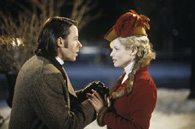
| Saturn Will Not Sleep - Discovery (Official Video) |

|
| home | movie reviews | features | sov horror | about | forum |
The Time Machine B
Year Released: 2002
It's hard to follow a classic. Not only must this latest version of The Time Machine satisfy fans of H.G. Well's science fiction masterpiece, but it must do so without trodding on George Pal's much-loved 1960 film adaptation in the bargain. A daunting task to be sure; however, director Simon Wells (the direct descent of Herbert George himself) seems up to it. This new Time Machine is hardly perfect, and purists may be put off by the changes it makes, yet it proves surprisingly serviceable. Even at its worst, it's not half-bad. This certainly is a Time Machine for the new millennium. It gives only cursory attention to Well's notions of idealistic pacifism in favor of a cautionary warning about the price of technology. It also gives the (originally anonymous) Time Traveler a name and a history, which has a profound impact on the direction of the plot. Rod Taylor played the Time Traveler in the 1960 version with focused intensity, a resolute idealist determined to outrun humanity's folly. Here, the sterling Guy Pearce takes a much different direction, with equally successful results. His "Alexander Hartdegen" is a disheveled absent-minded professor, all flustery theories, and chalk-covered tweed. Pearce strikes a nice balance between the character's immense intellect and awkward social graces, while still making a suitably hunky man of action. He's also trying to escape a tragedy. His beloved fiancé Emma (Sienna Guillory) dies during a botched robbery, leaving him devastated and guilt-ridden. Hartdegen's burning desire to undo the past prompts him to built the title device, hoping to travel backwards in time and somehow keep Emma alive. It doesn't work. The machine gets him there, but no matter what he tries, no matter how many times he goes back, he cannot change the outcome. Emma is eternally doomed. So he switches tactics. If he cannot change the past, he will go forward into the future... where he hopes to find the answer to his beloved's seemingly inescapable demise. Wells has a strong visual eye, and unfolds Hartdegen's tale with the requisite amount of flourishes. He understands the thrust of Well's novel, and the screenplay updates most key events without losing their essence. The film works best on its most intellectual level. The new subplot gives Wells a chance to explore notions of paradox and cause-effect loops, something the novel never really touched. Alexander's inability to alter the past gives rise to a whole host of questions, which The Time Machine handles thoughtfully and well. Pearce has several terrific pieces of dialogue expounding his dilemma, including a scene with Jeremy Irons (in a glorified cameo) that marks the film's high point. Unfortunately, those elements sometimes come at the expense of more integral features. Hartdegen eventually arrives eight hundred thousand years in the future, where humanity has divided into two tribes. The peaceful, innocent Eloi live in Edenic splendor while the feral Morlocks live below ground and hunt the Eloi for food. These were a vital part of the novel, and while the film gives them cursory attention, it glosses over their elegant core. The book's cruel irony -- its meditation on paradise at a terrible cost -- feels curiously rushed here, as we move through it too quickly in favor of Hartdegen's quixotic quest. They serve more as an excuse for some middling action sequences than a truly important part of the story... something Wells purists may have a hard time forgiving. The Morlocks are a mixed bag on a technical level as well. Though the special effects rendering their movement and general look are first rate, the makeup and facial prosthetics are positively embarrassing. One glance at them and you can instantly see the guy in the mask, which all but destroys The Time Machine's carefully prepared atmosphere. It's all the more glaring in the face of the otherwise immaculate production design, from the stunning landscape shots to the glass-and-clockwork edifice of the time machine itself. The special effects are suitably spectacular (including some terrific time travel sequences) and the Morlock's underground kingdom conveys a proper sense of dread. It's a pity such care couldn't be extended to the entire production. Despite these flaws, however, The Time Machine does a reasonable job of keeping everything together. Wells moves things along briskly, and manages to make his point without stumbling over the details. While it feels rough and unfinished at points, it never really loses its way, and for all the liberties it takes, it never does disservice to the novel at its source. The pleasures it provides are more than worthwhile, regardless of where and how it reaches them. The Time Machine has some big shoes to fill and despite a few missteps, it wears them pretty well... even if it's not quite a perfect fit. Review published 03.05.2002. Also read: Anatomy of a Press Conference.
|

|
| home | movie reviews | features | sov horror | about | forum |
| This site was previously at flipsidemovies.com from 2000 to 2008. |
|
contact | copyright | privacy | links | sitemap
Flipside Movie Emporium (FlipsideArchive.com)
|